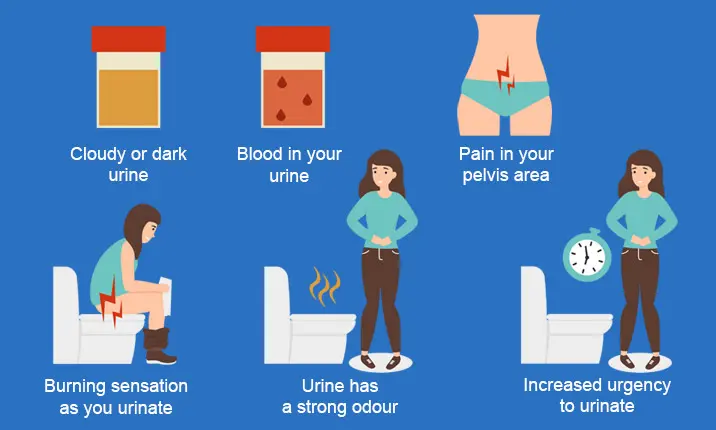UTI in females
If you experience pain or pass blood as you pee, you might have picked up a urinary tract infection (UTI). Unpleasant, and sometimes, debilitating, the condition is more effectively treated if discovered early. Recognise the symptoms of female UTI early and taking the right course of treatment should have things back to normal in 2 – 3 days.
What is a UTI?
A UTI is an infection in your urinary tract. It can affect your urethra, bladder, ureters or kidneys. While an infection in your lower urinary tract such as the bladder or urethra can be really unpleasant, infection in the upper urinary tract, such as in the kidneys, is more severe and can be potentially life-threatening.
What are the causes of UTI in females?
Women are more prone to UTI than men due to their anatomical structure. The infection is more often caused by bacteria, but can be a result of fungi. It is often a result of some form of irritation to the urinary tract as a result of sex, as well as the use of a diaphragm, spermicide, lubricant jelly and condoms
Women may be more likely to have a UTI if they have a weakened immune system. This is why holding on to your bladder, or not drinking enough of water, could increase your chances of a UTI, especially if you have had a UTI before.
Other factors that can cause a UTI include:
- diabetes
- menopause, as oestrogen levels change
- prolonged immobility
- prolonged use of urinary catheters
- urinary structure birth defects
- urinary tract obstructions or blockage such as kidney stones
Being pregnant isn’t a risk factor for UTIs but if you have one while pregnant, the risk of it affecting the kidneys is greater.
What are the symptoms of UTI in females?
The symptoms you will feel will depend on where the infection is in your urinary tract.
Lower UTI
This involves the urethra and bladder. It is commonly known as cystitis and your symptoms may include:
- burning sensation as you pee
- cloudy or very dark urine
- increased urgency to urinate
- needing to urinate more often but unable to pass much urine
- pain in your pelvis area
- passing blood with your urine
- urine that has a strong odour
Upper UTI
This affects the kidneys and can be potentially life-threatening if bacteria move into the blood stream. This may cause dangerously low blood pressure, shock and even death. Should you experience the following symptoms, visit the Urgent Care Centre (UCC) immediately.
- chills
- fever
- nausea
- pain and tenderness in the upper back and sides
- vomiting
What are the complications of UTI?
Left untreated, a UTI can have serious consequences that may include:
- Increased risk in pregnant women of delivering low birth weight or premature infants
- Permanent kidney damage from an acute or chronic kidney infection
- Recurrent infections
- Sepsis, a potentially life-threatening complication of an infection, especially if the infection works its way up your urinary tract to your kidneys.
When should you see a doctor for a UTI?
If treated early, there should not be complications from a UTI. However, the condition will not be resolved without medical intervention. For lower tract infections, visit the UCC immediately to get your urine tested as soon as you start to notice blood or pain with the passing of urine. Treatment usually involves a course of antibiotics. If the symptoms persist, you should go back to your doctor or consult a urologist.
If left untreated, a UTI can spread up the urinary tract and affect the kidneys. This is more difficult to treat and can be life-threatening if the infection passes into your blood stream.
Don’t be tempted to resort to home remedies. They will just delay your treatment and make the UTI more difficult to treat.
Treating a UTI
Your doctor will first obtain a correct diagnosis from a urine culture test to make sure you are suffering from a UTI and not something else. This will also identify if the cause of the infection is bacterial, viral or fungal and determine the right course of treatment.
Most cases are caused by bacteria and treated with antibiotics. If your infection is fungal, you will be given antifungal medication. Drink plenty of water to help flush out your urinary tract.
If your doctor suspects an upper tract UTI, you may need to undergo scans, blood tests and blood culture to check that the infection hasn’t spread into your blood stream.
For severe upper UTI, you may be warded in hospital for observation to ensure that the prescribed medication is working.
What are the preventive measures for UTI in females?
- Drink 6 – 8 glasses of water spread throughout the day to stay hydrated.
- Go to the toilet when you have the urge. Don’t hold urine for long periods of time.
- Pass urine after you have sexual intercourse to flush out any potential bacteria before it gets hold.
- Don’t use potentially irritating feminine products such as deodorant sprays or douches and powders in the genital area as they can irritate the urethra.
- Change your choice of barrier contraception if you suspect that it is a cause of UTI.
- If you suffer from urinary incontinence or have difficulties fully emptying your bladder, talk to your doctor about managing this to reduce the risk of a UTI.
- In menopause, talk to your doctor about taking topical medication.
- If you have recurrent UTIs, talk to your doctor about taking preventive antibiotics long term or the use of cranberry supplements or probiotic to keep a healthy vaginal pH.
Diagnosing UTI in females
Having a UTI is an extremely uncomfortable condition and can be very debilitating. Having to take repeated days off work or disruption to your daily routine to manage it is not ideal, so you’ll want to have the cause investigated. While most repeat cases are from reinfection with the same type of bacteria, recurrent cases could be due to an abnormality in the structure of the urinary tract. Your doctor may arrange for tests to rule out blockages or other structural abnormalities. These can include:
- An ultrasound taken over your abdomen to check for any blockage of your urinary tract.
- An x-ray of your abdomen following the injecting of a dye into your urinary tract so it shows up on the x-ray.
- A cystoscopy, in which a tube with a small camera at the tip is inserted through your urethra and up into your bladder. Your doctor may also remove bladder tissue to test to eliminate bladder inflammation or cancer as a cause.
- A computerised tomography (CT) scan for detailed images of your urinary system.














